|
We're busy catching you up to
our new newsletter system - if you have already read a version
similar to this, apologies!
Micky gets new companions
For many months the Victoria Falls Crocodile Farm wanted a
lioness as a companion for their captive lion Micky, who lost
his former 'wife' to illness. Chipangali in Bulawayo
fortunately had two gorgeous lionesses, Lyla and Shadow, whom
they were willing to give away, due to space constraints.
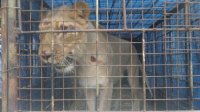
AWARE facilitated the relocation of these lionesses to the
Crocodile Farm and after months of waiting for the correct
paperwork, the lionesses were finally moved. The mileage was
covered by the Vic Falls Croc Farm, while AWARE personnel gave
their time and equipment for free. 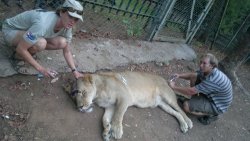 After a
very stressful journey in which the lionesses rubbed raw
patches on themselves despite heavy sedation, we faced a
challenge releasing them into their new enclosure. Micky was
locked up in the management pen, so that could not be used, and
the main gate to the enclosure was too big to just pull the
transport crates up to and open the doors. We ended up having
to anaesthetise Lyla and Shadow for the second time in a day in
order to release them in their new enclosure. After a
very stressful journey in which the lionesses rubbed raw
patches on themselves despite heavy sedation, we faced a
challenge releasing them into their new enclosure. Micky was
locked up in the management pen, so that could not be used, and
the main gate to the enclosure was too big to just pull the
transport crates up to and open the doors. We ended up having
to anaesthetise Lyla and Shadow for the second time in a day in
order to release them in their new enclosure.
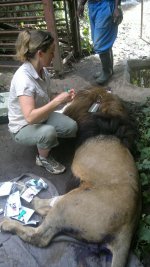 Micky,
being a good natured lion, fell in love instantly, and the
three have bonded well. Aware vets implanted the lionesses with
contraceptive devices at the time of release, but knowing these
will only last for a year we took the opportunity of an
unrelated work trip to Vic Falls in February to give Micky the
snip. He had one retained testicle which had to be
fully Micky,
being a good natured lion, fell in love instantly, and the
three have bonded well. Aware vets implanted the lionesses with
contraceptive devices at the time of release, but knowing these
will only last for a year we took the opportunity of an
unrelated work trip to Vic Falls in February to give Micky the
snip. He had one retained testicle which had to be
fully
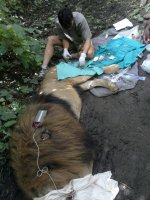
removed and the second testicle
was vasectomised so that he can keep his testosterone (and
therefore his impressive mane). The operation - which is part
of AWARE's goals to reduce captive lion breeding - was
performed under far from ideal working conditions by AWARE
Vets. The operation included the application of some much
needed Frontline for ticks.
Their new enclosure is large and one of the nicest pens for
captive lions in the country - it has a stream flowing through
it; monkeys and baboons chatter to the lions from the tree tops
and buck often walk past the fence in the evenings. All three
are much happier now.
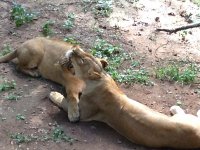 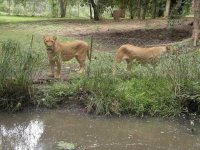 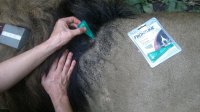
Rhino 'Kapfupi' treated for
torn ear
In February, AWARE Trust
responded to a request from the Parks and Wildlife Management
Authority at Kyle. The astute Park's Rangers had noticed that
Kapfupi, an old male white rhino who was dehorned by AWARE last
year, appeared to have a large amount of blood around the neck
and ear region and were worried he might have a serious injury.
At short notice, AWARE vets mobilised a helicopter to attend to
this rhino with all possible speed. Kapfupi knew that something
was up and chose to hide in thick bush while the Rangers kept
continuous and watchful eyes on him from a discrete distance.
Working conditions were far from ideal as the heavy rains had
made the dirt roads impassable, making access for the National
Parks and AWARE ground teams very difficult, coupled with the
extremely thick and thorny bush. In such conditions there is a
real danger that, after darting, Kapfupi could “go to sleep” in
a shallow stream, and drowning was a concern. Thanks to the
skills of helicopter pilot, NJ, Kapfupi was kept on higher
ground, albeit in thick bush, until the dart took effect.
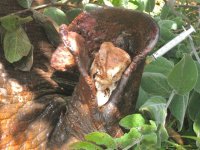 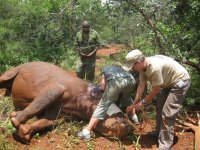 Kapfupi's right
ear was completely torn through and infested with maggots.
Fortunately the ear wound was the sole source of the blood the
Rangers had originally noticed, and there were no other serious
wounds on his neck. The ear was cleaned up and Kapfupi was
given antibiotics, fly and tick topical remedies and a general
health check before he was woken up by reversing the effects of
the dart. Parks' Staff and Rangers reported Kapfupi's injury,
tracked and stayed with him while the AWARE vets mobilised the
team and greatly assisted in this exercise. The Rangers were
very helpful and speedily and enthusiastically assisted the
AWARE team in carrying heavy oxygen bottles and other equipment
through thick bush and in muddy conditions. The whole exercise
was very well carried out by all involved and Kapfupi will heal
and will continue to enjoy his life, protected and cared for by
his Rangers, who remain with their rhino 24/7 - you probably
won't see them, but they are always there! They are dedicated
and committed to protecting Zimbabwe's precious rhinos. Kapfupi's right
ear was completely torn through and infested with maggots.
Fortunately the ear wound was the sole source of the blood the
Rangers had originally noticed, and there were no other serious
wounds on his neck. The ear was cleaned up and Kapfupi was
given antibiotics, fly and tick topical remedies and a general
health check before he was woken up by reversing the effects of
the dart. Parks' Staff and Rangers reported Kapfupi's injury,
tracked and stayed with him while the AWARE vets mobilised the
team and greatly assisted in this exercise. The Rangers were
very helpful and speedily and enthusiastically assisted the
AWARE team in carrying heavy oxygen bottles and other equipment
through thick bush and in muddy conditions. The whole exercise
was very well carried out by all involved and Kapfupi will heal
and will continue to enjoy his life, protected and cared for by
his Rangers, who remain with their rhino 24/7 - you probably
won't see them, but they are always there! They are dedicated
and committed to protecting Zimbabwe's precious rhinos.
Rhino strategy meeting
AWARE was invited to attend the
Rhino Policy and Management Framework KPI Workshop and Rhino
Strategy Meeting on 11 and 12 March. Bringing together Zimbabwe
Parks and Wildlife Management Authority, Zimbabwe's rhino
custodians, interested parties and supported by Save African
Rhino Foundation Australia, the dedication of all parties was
clear as was the huge amount of work being done by everyone to
save Zimbabwe's rhinos. There is an overwhelming amount of work
to be done in 2014 which can only be really be achieved with
the generosity of donors and funds which are desperately needed
as well as public support against poaching. We are pleading to
Zimbabweans and the world at large to help us fight to save
this incredible but diminishing species.
Crop raiding zebra rescue
At Parks and Wild Life Management
Authority’s request, the AWARE Trust went to rescue two male
zebras who were in conflict with rural farmers and were at risk
for eating their crops. Naturally, on arriving at the farm, the
zebras were nowhere to be seen; they knew we were coming! After
much time searching the surrounding area and much patient
waiting by the team, as we prepared to call it a day, the two
zebras turned up happily grazing amongst a herd of cattle and
goats, probably thinking they were sufficiently disguised from
us! Anton and one AWARE vet cleverly used that same herd of
cattle in order to get close enough to successfully dart the
zebras. With many willing hands ready to help, the heaviest
zebra was lifted into the transport cage whilst the smaller,
lighter one was transported in the back of an open
truck.
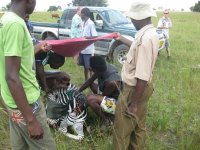 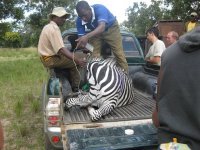 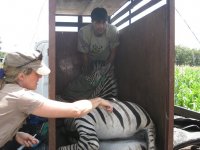 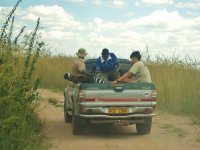
Both animals were continually
monitored during the journey and, despite a breakdown of one of
the transport trucks, both zebra's were successfully
transported and safely released at Chivero Game Park. Another
great team effort and our thanks to the gentleman who stopped
to offer assistance when the truck broke down.
Heron rescue
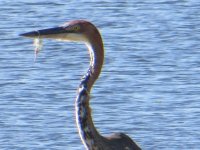 Veronica Chapman from Environment Africa called
to see if AWARE Vets could help rescue a goliath heron
which she had noticed had fishing tackle wrapped around its
beak for several weeks. It could apparently eat but it was
unknown if the tackle had been partially swallowed and whether
the beak could open fully. Anton lives near Lake Chivero and
was only too happy to go and try to rescue this large beautiful
bird. After an initial recce with Veronica and Parks and
Wildlife Management Rangers, it was decided that ordinary bird
netting would not suffice, so Anton called on NJ and Ron from
African Wildlife Management and Conservation to bring their net
gun in order to rescue the bird. Veronica Chapman from Environment Africa called
to see if AWARE Vets could help rescue a goliath heron
which she had noticed had fishing tackle wrapped around its
beak for several weeks. It could apparently eat but it was
unknown if the tackle had been partially swallowed and whether
the beak could open fully. Anton lives near Lake Chivero and
was only too happy to go and try to rescue this large beautiful
bird. After an initial recce with Veronica and Parks and
Wildlife Management Rangers, it was decided that ordinary bird
netting would not suffice, so Anton called on NJ and Ron from
African Wildlife Management and Conservation to bring their net
gun in order to rescue the bird.
With the added assistance of
Josh from Kuimba Shiri, after locating the heron from a speed
boat and a few hours of attempting to get close enough to the
bird to fire the net gun, they managed to catch it without
injury. The twine was in two separate pieces around the top and
bottom beak. It was removed and the bird was taken to the bird
park to be released in an open enclosure from which he could
fly after he had sufficiently rested.
It is great to know that people will go to such lengths and
put in so much time and effort to rescue creatures such as
this. Well done to all.
Boost for donkey clinics
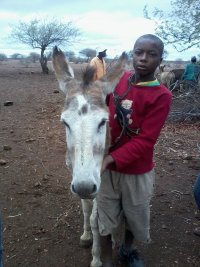 With the
wonderful news that SPANA has agreed to continue to support
Zimbabwe's donkey clinics for the next 5 years, channelling
this support through the AWARE Trust, the vets have had a busy
March holding clinics in the Beitbridge Area and Mashonaland
Central. At Shashe and Lutumba heavy rains, flooded bridges and
reports of vehicles stuck fast in thick mud, delayed the AWARE
vet. After being forced to spend a night in Beitbridge town, a
longer route to Shashe had to be taken extending the slow,
slippery drive by 50 km's, with Erick arriving in the evening
in a heavy downpour. Thankfully the bridge near Shashe shops
had not flooded but 30 minutes after Erick had crossed the
bridge reports came in that two men with their donkeys pulling
a cart had been swept away trying to cross this same bridge.
The torrent swept both men approx 300 metres along the river
with one brave man jumping in to attempt to rescue the men and
donkeys. Sadly one of the donkeys was swept away but the two
men and the remaining donkey were successfully rescued. With the
wonderful news that SPANA has agreed to continue to support
Zimbabwe's donkey clinics for the next 5 years, channelling
this support through the AWARE Trust, the vets have had a busy
March holding clinics in the Beitbridge Area and Mashonaland
Central. At Shashe and Lutumba heavy rains, flooded bridges and
reports of vehicles stuck fast in thick mud, delayed the AWARE
vet. After being forced to spend a night in Beitbridge town, a
longer route to Shashe had to be taken extending the slow,
slippery drive by 50 km's, with Erick arriving in the evening
in a heavy downpour. Thankfully the bridge near Shashe shops
had not flooded but 30 minutes after Erick had crossed the
bridge reports came in that two men with their donkeys pulling
a cart had been swept away trying to cross this same bridge.
The torrent swept both men approx 300 metres along the river
with one brave man jumping in to attempt to rescue the men and
donkeys. Sadly one of the donkeys was swept away but the two
men and the remaining donkey were successfully rescued.
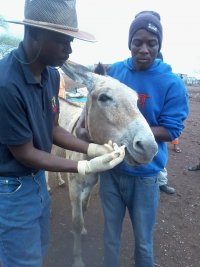 As heavy
rains continued, access to the clinics proved difficult.
Numbers of owners bringing their donkeys to Shashe were reduced
with many failing to cross the swollen river to the Animal
Health Management Centre. The conditions also made it difficult
for the vet to drive around to access the donkeys. The
Machuchuta community was inaccessible. However a total of 65
donkeys were attended to at Shashe, with 50 of these receiving
rabies vaccinations and all donkeys were dipped due to high
tick infestation and any wounds were treated. At Lutumba 88
donkeys were treated, all vaccinated for rabies, dipped and had
general health checks. Eye problems (linked to habronemiasis, a
parasitic disease) were treated with tetracycline eye ointment.
Some facial wounds were noted and were treated by applying
petroleum jelly mixed with ivermectin to deal with habronema. A
few wounds caused by poor harnessing were noted at both centres
and the wounds were cleaned and zinc oxide paste applied. In
total 153 donkeys were attended to, being a low turnout for
such clinics, but understandable considering the weather
conditions. In the Centenary District of Mashonaland Central,
the communities visited were Machaya (63 donkeys), Hoya (104
donkeys) As heavy
rains continued, access to the clinics proved difficult.
Numbers of owners bringing their donkeys to Shashe were reduced
with many failing to cross the swollen river to the Animal
Health Management Centre. The conditions also made it difficult
for the vet to drive around to access the donkeys. The
Machuchuta community was inaccessible. However a total of 65
donkeys were attended to at Shashe, with 50 of these receiving
rabies vaccinations and all donkeys were dipped due to high
tick infestation and any wounds were treated. At Lutumba 88
donkeys were treated, all vaccinated for rabies, dipped and had
general health checks. Eye problems (linked to habronemiasis, a
parasitic disease) were treated with tetracycline eye ointment.
Some facial wounds were noted and were treated by applying
petroleum jelly mixed with ivermectin to deal with habronema. A
few wounds caused by poor harnessing were noted at both centres
and the wounds were cleaned and zinc oxide paste applied. In
total 153 donkeys were attended to, being a low turnout for
such clinics, but understandable considering the weather
conditions. In the Centenary District of Mashonaland Central,
the communities visited were Machaya (63 donkeys), Hoya (104
donkeys) 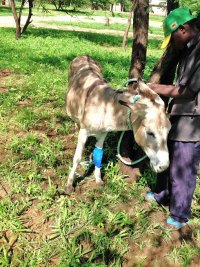 and
Mzarabani (170 donkeys) totalling 337 donkeys attended to.
Again, conditions here were difficult with heavy rains making
many areas inaccessible and owners failing to cross flooded
rivers. Health checks were carried out on each donkey, 300
donkeys received rabies vaccinations and 208 were dewormed.
Being the primary farming season, the donkeys are worked
extremely hard, with many having varying degrees of wounds on
their necks and hind quarters. These wounds were treated with
Venton wound oil after shaving and thorough cleaning with
betadine solution. Antibiotics were administered where wounds
were infected. Other cases noted were ocular pathologies,
diarrhoea, respiratory conditions, and lameness.This was the
first time the SPANA/AWARE mobile clinic has visited this area
and it was noted that yokes were being used on many of the
donkeys. However, the majority of owners agreed that yokes were
not ideal but had no knowledge about proper harnesses nor
access to them. The vets explained the advantages of harnesses
over yokes and the benefits to the donkeys and therefore the
owners themselves. and
Mzarabani (170 donkeys) totalling 337 donkeys attended to.
Again, conditions here were difficult with heavy rains making
many areas inaccessible and owners failing to cross flooded
rivers. Health checks were carried out on each donkey, 300
donkeys received rabies vaccinations and 208 were dewormed.
Being the primary farming season, the donkeys are worked
extremely hard, with many having varying degrees of wounds on
their necks and hind quarters. These wounds were treated with
Venton wound oil after shaving and thorough cleaning with
betadine solution. Antibiotics were administered where wounds
were infected. Other cases noted were ocular pathologies,
diarrhoea, respiratory conditions, and lameness.This was the
first time the SPANA/AWARE mobile clinic has visited this area
and it was noted that yokes were being used on many of the
donkeys. However, the majority of owners agreed that yokes were
not ideal but had no knowledge about proper harnesses nor
access to them. The vets explained the advantages of harnesses
over yokes and the benefits to the donkeys and therefore the
owners themselves.
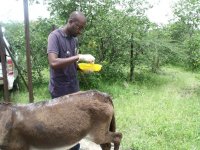 Owners were keen to adopt harnesses if they were
available and requested to be provided with samples to allow
them to make harnesses using materials available to them. Also
noted was that some communities had a tendency of tying the
donkeys' front limbs together at fetlock level to restrict the
donkeys' movements and reduce their chances of wandering into
neighbours' fields. This causes abrasive wounds around the
fetlock and owners were instead advised to stable their donkeys
at night. As well as being appreciated by the Department of
Veterinary Services, the community and owners very much
welcomed these clinics and all advice given. Owners were keen to adopt harnesses if they were
available and requested to be provided with samples to allow
them to make harnesses using materials available to them. Also
noted was that some communities had a tendency of tying the
donkeys' front limbs together at fetlock level to restrict the
donkeys' movements and reduce their chances of wandering into
neighbours' fields. This causes abrasive wounds around the
fetlock and owners were instead advised to stable their donkeys
at night. As well as being appreciated by the Department of
Veterinary Services, the community and owners very much
welcomed these clinics and all advice given.
Appreciation as always, SPANA
and the AWARE Trust thank and are grateful to the various
Veterinary Departments and Veterinary Extension Assistants for
their committed assistance and for campaigning to make these
clinics possible. Thanks too for the provision of safe camping
sites and offers to open their homes, to those who helped to
record information and take photos. Without such assistance
these clinics would not be possible.
Not least of all, AWARE thanks
SPANA for its continual and much appreciated support to
Zimbabwe's donkey populations and their owners. Appreciation
should also go to the vets for their determination to continue
with the clinics despite the dire conditions.
AWARE thanks all its
loyal donors who have supported us in so many ways; we do not
have the room here to thank you all. Our special thanks
to Anton from Lion & Cheetah Park, NJ and Ron from AWMC and
to Zimbrellas & Homes, Redan, Wild Imaginings and Cheeseman
for their continual and unstinting support. If you would
like to assist AWARE we are continually seeking funding for our
many projects. We also need to assist the National Park's
Rangers with water bottles, tents, sleeping bags, cameras, rain
coats, two way radios, solar lights, lithium Energiser AA
batteries or absolutely anything that you may have stashed away
which will help for their comfort and safety whilst carrying
out their difficult tasks.
|